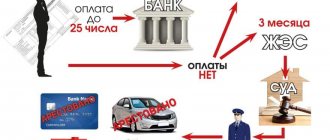Home / Eviction / We are engaged in the eviction of an unregistered person who is not the owner from an apartment
Issues with eviction from housing often arise at the most unexpected moment. It would seem that the owner behaved carefully, did not register not only strangers, but also relatives on the square meters he owned. But even in this case, he may find himself in a difficult situation requiring legal assistance.
When does an owner become a former owner?
Who are the former owners? These are people who had the right to own, use and dispose of real estate . However, in the process of carrying out a purchase and sale transaction, barter, donation, and so on, these people lost the right to own the premises. This right has passed to other persons who are now the owners (is it possible to evict the owner from the apartment?).
However, the former owners have retained the corresponding registration in the residential premises, as a result of which difficulties may arise (is it possible to evict a registered person if he is not the owner?). Despite the fact that a person can no longer dispose of the premises, he retains the right to use it, which the new owners do not always like.
If the former owners do not cause any trouble to the new owners, then the issue of deregistration is temporary and not urgent. But sometimes former owners try to use the situation to their advantage by simply not leaving the premises.
The following persons may become former owners:
- ex-spouses (how to evict a former and current spouse, cohabitants?);
- relatives;
- former owners of the premises;
- minor children who, by law, cannot be discharged without complying with the relevant requirements.
Grounds for eviction of an unregistered owner of an apartment
The owner of a privatized apartment can be evicted from a residential premises only in exceptional cases:
- The building in which the apartment is located is in disrepair and unsuitable for habitation. In this case, all residents of the apartment building are evicted to avoid possible harm to the health and lives of people. Find out about the demolition of dilapidated and emergency housing here.
- The land on which the house is located is seized for the needs of the municipality. This situation is possible if the adjacent plot on which the house is located is not privatized by the owners of the apartments of the apartment building, but is the property of the municipality.
Before you evict an unregistered person from an apartment, if he is its owner, you need to compensate him for material damage or provide him with other housing of similar size and communal services.
Grounds for their eviction and differences in procedures
Living under a will
The premises can become property not only as a result of the execution of a purchase and sale agreement, but also by will. It is likely that the property was transferred not clean, but there are registered citizens in it. In such a situation, discharge is possible only through a court. The transfer of ownership of real estate under a will is the basis for an extract .
Before inheritance
Before entering into the right of inheritance, it is not possible to evict registered citizens, since the heir has not yet become the full owner of the premises. Only after the ownership papers have been prepared can the procedure be initiated by going to court.
From purchased real estate
Even before concluding a purchase and sale transaction, the citizen must be informed that there are also third parties registered on the square meters . However, if this was not done, two scenarios are possible.
- In the first case, the transaction can be declared invalid through the court, which means it can be completely annulled, since no such circumstances were agreed upon when the contract was signed.
- It is also possible to evict registered persons through a court settlement or through legal proceedings.
Other cases
Eviction of a spouse is possible in a situation where he (she) was previously invited to the owner's premises as a family member. Since the family relationship was interrupted, other relationships, including housing, are also broken due to the termination of the marriage.
However, if the premises were purchased at the time when the people were married, then in accordance with Article 31 of the Housing Code, eviction is impossible (to find out whether it is possible to evict a former and current husband or wife, as well as cohabitants from an apartment and how to do this, can be found here).
Debts on alimony and housing and communal services
A simple delay in the payment of alimony arising due to extenuating circumstances will never become a basis for the alienation of a privatized apartment. But if the property owner is a persistent defaulter, this may result in the apartment being put up for sale. However, the court will first seize the living space and prohibit any transactions related to real estate.
Also, large debts for paying for housing and communal services can lead to eviction from an apartment .
Utility services have every reason to go to court and demand forced collection of debts. If the court is on the plaintiff's side, the apartment will be sold at auction, and the proceeds will be used to pay off the debt. Important! Deprivation of the right to real estate is a last resort and is applied only in cases where the amount of arrears for alimony or housing and communal services payments reaches particularly large sizes and becomes equal to the cost of the apartment itself.
Eviction from public housing
Responsibilities for paying utility bills for citizens living in an apartment on the basis of a social tenancy agreement are no different from owners who have privatized their housing.
Rather, it’s the other way around: when debt arises, residents of non-privatized real estate find themselves in a less advantageous position.
According to Article 90 of the Housing Code of the Russian Federation, debts for paying housing and communal services that have accumulated over six months are already grounds for eviction of residents from an apartment owned by the state. In this case, the best the debtor can count on is a room in a dormitory.
Exceptions can be made if there are good reasons: for example, the tenant was temporarily disabled or was fired or laid off. Also, the following cannot be evicted from a municipal apartment:
- persons with disabilities;
- incapacitated citizens who are on state support.
If there are minor children
The Russian state pays special attention to the rights of children and adolescents under 18 years of age. Therefore, eviction of minor citizens for debts is extremely difficult .
When a child is the owner of privatized real estate, it will be possible to discharge him from the apartment only after permission from the guardianship authorities. In return, the minor must receive equivalent housing.
Important! A citizen under 18 years of age cannot be forcibly evicted from municipal housing either. This procedure can only be possible with the written permission of the parents.
Process initiator
In most cases, the real owner of the residential premises has the right to initiate the eviction process with subsequent appeal to the court. It is he who takes all the necessary actions to achieve the result.
But judicial practice also knows cases when third parties take the initiative for eviction. As a rule, these are relatives of the new owner, whose interests are infringed due to the residence or registration in the apartment of the former owners. These persons have the right to initiate the eviction process, since they live in the occupied territory and their rights have been violated in one way or another.
Eviction of minor children
It is possible to discharge a child from a privatized apartment, but subject to certain conditions. If a minor is registered in the apartment after privatization, by registering his parents, then he can be discharged on the basis of deregistration of his parents. If the child was registered before privatization, then a resolution from the guardianship and trusteeship authority will be required to evict him. This means that the procedure for discharging a child from a privatized apartment depends on the stage at which he was registered in the apartment - before or after privatization.
How to evict?
It is necessary to resort to pre-trial methods of resolving the issue. And this means contacting the former owner and asking him to carry out the deregistration voluntarily. If a refusal occurs, you must perform the following actions :
- A package of documents is being collected.
- Draws up a statement of claim.
- State duty is paid.
- An application is made to the court to submit documents.
- Thirty days of waiting until the court considers the papers.
- Setting a trial date.
- Preparation of documents and witness statements for the fact of the proceedings.
- Participation in legal proceedings.
- Obtaining a court decision.
Already having a court decision in hand, you need to contact the territorial body of the Ministry of Internal Affairs . The court decision is drawn up, an application is filled out, on the basis of which the deregistration occurs. The departure sheet is prepared within 3 days and after that is issued as a certificate of execution of the decision.
Jurisdiction
This category of cases falls under the jurisdiction of the district court. In accordance with Article 28 of the Civil Procedure Code of the Russian Federation, you must apply to the district court at the defendant’s place of residence. If it coincides with the place of residence of the newly made owner, then the task is simplified.
Documentation
- A statement of claim drawn up in accordance with the rules and requirements. It must meet the requirements of Article 131 of the Civil Procedure Code.
- A photocopy of the passport of the owner of the premises or the person filing the claim.
- A photocopy of the document that confirms ownership. In accordance with Federal Law 218, Article 28, this is an extract from the Unified State Register of Real Estate.
- Receipt for payment of state duty and its photocopy. In accordance with Article 333.19 of the Tax Code, state duty is required to be paid.
- Extract from the house register, original or copy.
Depending on the individual characteristics of each case under consideration, other documents may be required. For example, if a former spouse is being evicted, a divorce certificate will be required.
Proof
You need to support your arguments for the forced eviction of the former owner from the premises with appropriate evidence.:
- The first and most important evidence is a document that indicates that a person has lost ownership of the premises. This is a certificate of purchase and sale of an apartment, its transfer by inheritance, a certificate of divorce, and so on.
- Audio and video files that indicate that the citizen does not live in the premises or is systematically worsening its condition.
- Evidence that the citizen has been living in another premises for a long time, but does not intend to leave.
- Other evidence indicating that the citizen has purchased premises for himself in which he refuses to register.
Filing a claim
The statement of claim is drawn up on a blank white sheet of A4 format . This document must correspond to the sample that is presented in the office and on the website of the district court to which the appeal is made.
- In the upper right corner of the sheet you need to indicate to which authority the document is being submitted.
- Information about the plaintiff and defendant in accordance with Article 131 of the Civil Procedure Code. If the case involves third parties, you must indicate their initials and contact information.
- In the center of the sheet is the name of the document and the reason why it was compiled. This is recognition as having lost the right to use the premises upon transfer of ownership, eviction and deregistration.
- The text of the application indicates the fact of transfer of ownership rights to another person. It is told in accordance with which transaction such events occurred.
- It is established how many people are registered in the premises, but at the same time, are no longer related to it.
- Referring to Article 292 of the Civil Code, he proposes to evict the former owner upon termination of the right to use the residential premises.
- A reference is made to Federal Law 188, Article 35, according to which, upon termination of the right to use, a citizen must vacate the specified premises and no longer claim it.
- A list of accompanying documents is attached.
- The date of filing the claim and the signature of the plaintiff are established.
Who can initiate the procedure?
If a decision to evict an owner can only be made by a court, then the question of who can initiate the procedure has a much more detailed answer.
Thus, in accordance with current legislation, only :
- representatives of government authorities;
- representatives of municipalities.
Who can initiate the eviction of a homeowner for violating the rights of neighbors?
If we talk about neighbors who suffer due to the actions of the owner of a particular home, then representatives of government authorities will act on their behalf.
For example, a local police commissioner - if the evicted person systematically violated public order, a representative of the Rosreestr authorities - if an illegal redevelopment was carried out in a particular apartment, which the owner refused to correct, and his actions caused damage to the integrity of the building, etc.
Find out on our website how to evict illegal residents from an apartment, as well as whether it is legally possible to evict a minor child.
Why can you evict an apartment owner?
Why can you evict the owner?
There are a number of reasons why a violator may be deprived of a “roof over his head”, these include:
- Redevelopment , not coordinated with higher authorities, i.e. unauthorized, which endangered the house and the lives of the residents.
- Improper use of the apartment, leading to its destruction.
- Using square meters for other purposes than their intended purpose , thereby disturbing neighbors, creating difficulties and inconvenience for them.
- Systematic violations .
- Constant failure to pay utility bills (not the most compelling reason for deprivation of housing, if there is no other place to live, they will not be evicted for this).
Statement of claim for eviction from the owner’s apartment - sample
Will I be able to get him out onto the street?
During the process of forced eviction by court, no other alternative accommodation options for the evicted person are provided.
IMPORTANT! Article 40 of the Constitution of the Russian Federation prohibits depriving a person of his last home, that is, no one can force him to go “out on the street” (more nuances about whether it is possible to evict someone from their only home can be found in our article).
In such a situation with the defendant, the court may give additional time to resolve the housing issue.








